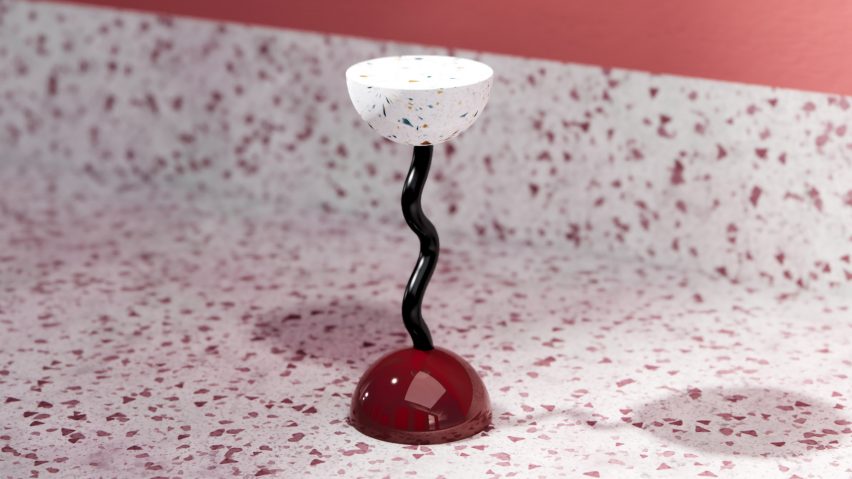Table legs double up as dumbbells and stools as push-up bars in this conceptual collection of furniture by Amsterdam design studio H-O-TT.
Called Furfit, it proposes five ways that common gym equipment could be merged with furniture, in a bid to open the benefits of at-home workouts up to those living in small spaces.
According to H-O-TT founder Luca Beltrame, the idea came about during coronavirus lockdown, when homes took on the role of makeshift offices and gyms.
"Living in a typical Dutch apartment, the space to work out wasn't generous, so we started to think about a way to upscale our living room and find an active use for the pieces of furniture that were otherwise limiting our movements," he told Dezeen.
"It's a way of transforming limitations into potential, simply achieving more with less."
The Iasius high stool, for example, can be simply turned on its side and used as a curl barbell, with its distinctive, sinuous handle doing double duty as a decorative element.
Five pairs of dumbbells between two and five kilograms form the legs of the Heracles coffee table, their weight signified by their colour and diameter, which can be seen from above.
In the Epimedes coat rack, a set of lighter dumbbells ranging from 0.5 to two kilograms act as pegs for holding clothes, while the top of the Idas side table can be taken off to turn it into a kettlebell.
And push-up bars – designed to make the classic exercise more challenging by increasing the user's range of motion – are rendered as a duo of stools with hemispherical seats that allow them to be laid flat on the ground.
Across the collection, a simple screw system would allow parts to be added or subtracted to change the weight and the object's function.
"The screw system follows the traditional mechanism of loading and unloading weights from gym equipment, which is bolt and screw," said Beltrame.
"For ease of use, comfortable grip and aesthetics, we have scaled up the thread size and carved it out of the shaft volume of the dumbbells," he continued.
"In the case of the coffee table, the mechanism is implemented clockwise and counterclockwise in each pair of dumbbells, creating a neutralising momentum that keeps the top surface stable."
Although the collection is purely conceptual at the moment H-O-TT hopes to find a partner to realise it, with the aim of presenting it at next year's Milan design week.
The idea is to render the pieces in three different styles to match different tastes, from a sophisticated version in brass, marble and oak to a more playful interpretation using vibrantly coloured terrazzo and resin. There are also plans to include a version made using reclaimed and recycled materials.
Furfit will remain useful even post-pandemic, Beltrame argued, since Covid-19 has simply acted as an accelerator of existing trends towards home workouts, as evidenced by the enduring popularity of YouTube fitness instructors.
"Homeworking will not disappear and home workouts won't either. At the same time, apartments in our cities will not get bigger," he said.
"The more cities have densified, the more it has become clear that we cannot afford to leave any space underused. If our home evolves to accommodate different activities in less and less space, subsequently our furniture will need to evolve, too."
Rhode Island studio Work in Use has previously fashioned a collection of high-end gym equipment from wood, brass and leather instead of plastic, while designers Candice Blanc and Ulysse Martel created holographic weights that can also be displayed as sculptures.

